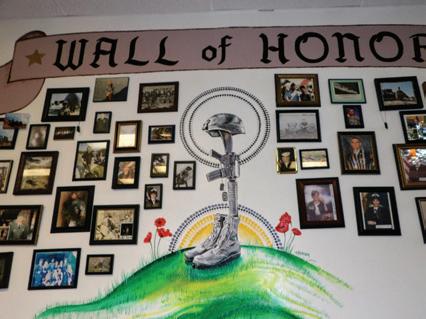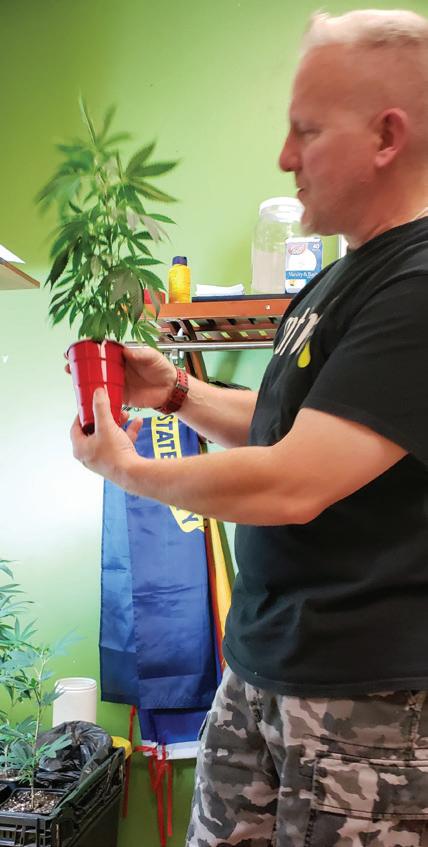
5 minute read
Hope Lives Here
BY MAGGIE SLIGHTE
Patrick “Saint” Seifert, a United States Marine Veteran, was reading an article about veteran suicide when he came upon a statistic that completely overwhelmed him. “It was a credible source; it was the VA [Veteran’s Administration], coming across that study… I was mad because I didn’t know about that number. Twenty-two a day, eight thousand a year… it’s frustrating.” The statistic that he is referring to, the number he used to name his organization for, is the number of United States Armed Forces Veterans who die by suicide daily. Although the number has been disputed, the Veteran’s Administration released the study in 2012 using data compiled from state death certificates. Katharine Seifert, Patrick’s wife and self-described Mrs. Twenty22Many doubts the number twenty-two (recently lowered to twenty by the VA), pointing out, “Think about all of the other statistics that our government puts out… think about it… how many times has our government lied to us. What on earth could that number possibly be, when our Gold Star Wife has lost, since her husband passed away, there have been two veteran suicides, in her neighborhood.” When asked if Katharine was a veteran also, Patrick was quick to point out that the work she does is more than equal to his service in his eyes, “It’s not easy being married to a Marine… I can’t imagine my life without her.” After he heard the statistic, he asked the veterans that he knew to get together, and they began having meetings with an intent to find a way to help other veterans who were in need of help. They had a goal before they had a name: To add PTSD to the list of qualifying conditions to use cannabis as medicine in Washington State. “It was first thing we did coming out of the gates, and it was successful.” Patrick brought the idea of the name “Twenty22Many” to the group in early 2015, about a month into the meetings. At the time he was the proprietor of a medical cannabis shop, governed by a state law that was replaced and revised when “recreational cannabis” was legalized in Washington state by popular vote in November 2012. 2 2
Advertisement

What the lawmakers and government officials had promised, did not come to pass, Patrick explained, “We were promised that if you were a ‘good player in medical’ you would be taken care of, but that didn’t happen.” Patrick was not granted one of the licenses when the new law was enacted and lost his shop. “There’s some legislation coming where they’re going to try to open up some compassion centers, and there’s some good things on the horizon. You never know, maybe Rainer Express’s days aren’t over yet,” Patrick says of the store he was forced to close when the laws changed. The loss of the cannabis business necessitated the forming of a 501(c)(3) to continue serving the needs of local veterans. “We are a grass-roots, allvolunteer organization. It’s an education center here… and many local businesses help.” Neither Patrick nor Katharine nor any of their volunteers get paid for their service working with Twenty22Many. What kind of work does Twenty22Many do? They provide education, information, and free cannabis recommendations to veterans, as well as starting a program that gives free cannabis clones and growing equipment to vets to enable them to grow their own medicine. When asked how cannabis helps him personally, Patrick shared “It brings me down to reality. I can’t imagine not having cannabis, I’d be in a padded cell.” Joining our interview was the Seifert’s 14-year-old daughter, Mandalynn, who was understandably upset by some of the stories the Seiferts shared about the veterans in the area. “It’s an eye-opener to be a kid under this roof… My parents are more understanding because they use cannabis. It’s frustrating,” Mandalynn “Mando” shared her annoyance with adults who don’t understand that cannabis is a medicine and how much it helps her parents. One very confusing paradigm described by the Seiferts is being played out in the lives of veterans in Washington state. Although cannabis is legal, in custody cases, children are being placed in less than desirable homes--away from their parents who are treating PTSD symptoms with cannabis. In these cases and many others, the only thing the Seiferts can do is to be there for the veterans who need them. When asked how each of us can help, Patrick says, “The most important part is to show up. We have so many events, and I get a little disappointed at the turn out.” He estimates that only about 20% of activists and advocates who follow their organization show up to events. “How would you feel, if you got the call, and I got the call when we lost John, how would you feel if you got the call that a veteran that is close to you commits suicide?” “Everyone knows a veteran, pick up the phone call them and tell them they are loved, special, and important.” That was something that Patrick’s mother said to him that stuck with him. “Sometimes the way we help is by showing up, go be a part of something bigger than yourself.” “We have to fuel the light because we are in so much need of it,” added Katharine. “Each person has their own magical thing. We have people who come to our events with medicine… bring your light out. Make a bridge, it’s contagious. The braver you can be… I want everybody to know you are not your illness… and whatever you’re good at I want you to do that… and if we share it, it gets bigger.” “Let’s find a way to make a wave that is big enough to make a change,” Katharine urged. Patrick and the volunteers at Twenty22Many are in the storefront headquarters every hour they can squeeze out. Being there when someone needs them is the goal. “A veteran can’t come through that door with a question that we don’t have an answer to, “says Patrick, “It says right on the window, hope lives here.”














